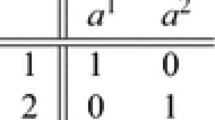Abstract
Egalitarianism presents the problem of baseline-dependence: egalitarianism from where? No collective choice can be egalitarian for all choices of a baseline. So the question arises as to whether and how the egalitarian program can be weakened in order to be compatible with baseline-independence. I characterize the set of choices that satisfy a minimal degree of inequality-aversion, embodied in the generalized Lorenz criterion, independently of the choice of a baseline. It turns out that this set coincides with the Lorenz-Utilitarian set, the set of Utilitarian choices which are not Lorenz dominated for any choice of baseline. Either this set is empty or it coincides with the Utilitarian set (when this is a singleton). Moreover, I also characterize the full Utilitarian set by using a standard requirement of impartiality (the Suppes-Sen criterion).
Similar content being viewed by others
Author information
Authors and Affiliations
Corresponding author
Additional information
I am grateful to Geir Asheim, Hervé Moulin, an Associate Editor and two referees for comments. I have also benefitted from comments by seminar audiences at University College London, University of Exeter and University of Aarhus, as well as the Social Choice and Welfare meeting in Alicante. Remaining errors are my own responsibility. Financial support and hospitality by ICER in Turin is gratefully acknowledged. The standard formalisations of modern Utilitarianism are by Harsanyi ([5], the “impartial observer theorem”, and [6], the “aggregation theorem”). There is, however, disagreement on the interpretation of these results. See Weymark [21], Roemer [15], Binmore [2] or Dhillon and Mertens [4] for critical discussions and for additional references.
25 January 1999
Rights and permissions
About this article
Cite this article
Mariotti, M. Inequality aversion, impartiality and utilitarianism. Soc Choice Welfare 22, 291–304 (2004). https://doi.org/10.1007/s00355-003-0213-2
Accepted:
Issue Date:
DOI: https://doi.org/10.1007/s00355-003-0213-2



